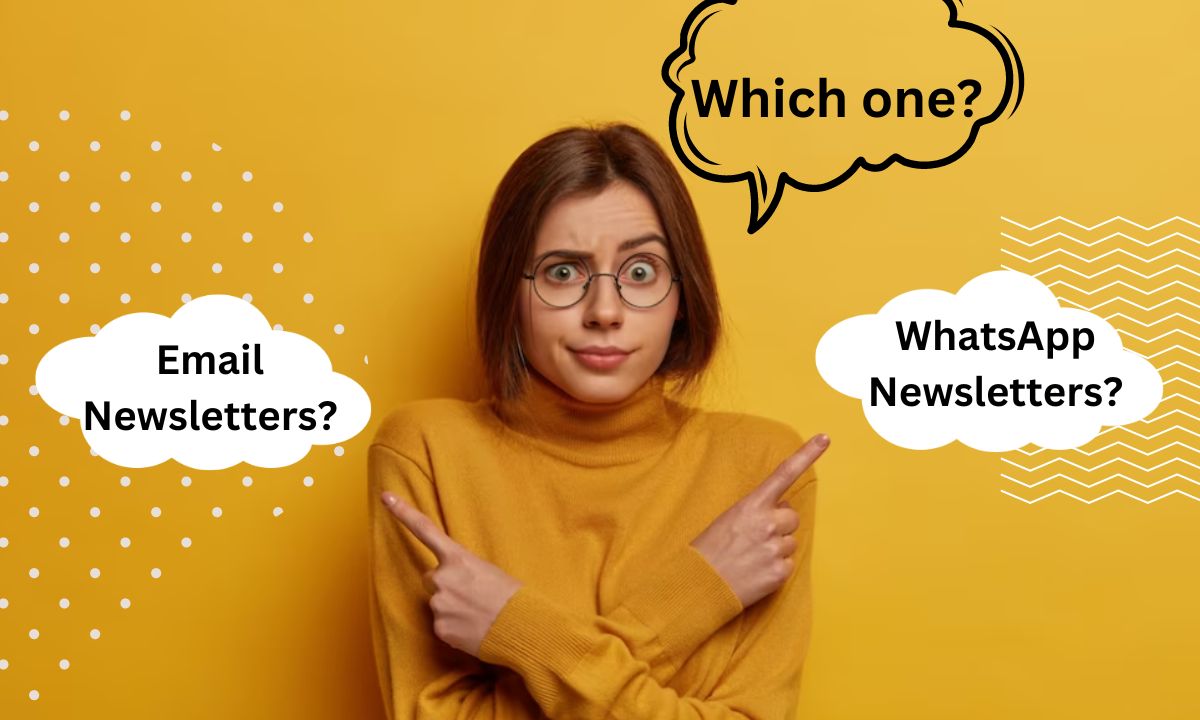Newsletters are a great way to share helpful content, establish credibility, and increase brand awareness.
They may include news, updates, promotions, industry insights, educational content, and more. — an effective way to stay connected with your audience, build brand awareness and drive engagement and sales.
But in recent years, WhatsApp has become increasingly popular as a platform for sending newsletters. What does that mean for email? Let’s see…
The shift towards mobile-first marketing
Did you know that people and businesses are shifting away from mobile-first marketing? There are a few reasons for this.
First of all, this generation is all about speed, and people want instant responses.
And the first medium to get hit as a result is email. The time it takes to respond and converse is extremely slow. You have to wait hours or even days for a response, which is pretty frustrating.
As a result, people are starting to look towards mediums like WhatsApp or social media to get in touch instead. Steadily, businesses are starting to realize that sending content through email might not be the best way to reach their customers.
A lot of promotional emails end up in spam or promotion folders, and even when they don't, there's a good chance that they'll never get opened.
In fact, an average person has 651 unread emails in their inbox? That's a lot of unread content!
That's why WhatsApp Newsletters are gaining popularity. Simply because they're more direct, and there's a higher chance that people will actually read the content that businesses are sending out.
Similarities between WhatsApp and Email Newsletters\ \ If you're a business looking to connect with your customers, you may be wondering which communication tool is right for you: WhatsApp or email newsletters?
Well, fear not! Let's take a closer look at some of the similarities between these two popular platforms.
(a) Relationship building:
Both WhatsApp and email newsletters provide businesses with an opportunity to build strong relationships with their customers. You can share updates, provide valuable content, and stay in touch with your customers on a regular basis. It's like having a direct line of communication with your most loyal fans!
(b) Personalization:
Both channels help you customize messages specific to a recipient. This can help you to create more engaging and relevant content, which is a key factor in building lasting relationships with your customers.
(c) Data Analytics:
Pretty straightforward here. Either channel helps you track the performance of your messages. You can see which messages are resonating with your audience and adjust your strategy accordingly. It's like having your own marketing crystal ball!
(d) Opt-in requirements:
Never expect to pop into a user’s inbox out of nowhere expecting to pick up conversations. Either you will be ignored or blocked.
Be it WhatsApp or Emails, both require users to opt-in to receive messages from your business. This ensures that you're only communicating with people who are interested in what you have to say. Plus, it helps to avoid those pesky spam filters (in the case of emails).
(e) Deliverability challenges:
Uff… This is a true pain in the ass. For email newsletters, it could be spam filters or email providers flagging messages as promotional. For WhatsApp newsletters, it could be users not having the app installed, notifications turned off, or even worse, you sending it to the wrong number.
And the key differences…
While WhatsApp and email newsletters share some similarities, they also have their own unique benefits and challenges. So, when deciding which platform to use for your business, be sure to consider what's best for your specific goals and audience.
\ Email or WhatsApp Newsletters. Which suits the best for your newsletters?
Did you know that both email newsletters and WhatsApp newsletters can offer customization options for businesses?
However, they each have their own unique way of doing so.
Email newsletters provide a wider range of customization options, including the ability to add images, graphics, and videos.
This can make newsletters more visually appealing and catch the attention of your audience.
Additionally, email newsletters offer more segmentation options, which allows you to target specific groups of subscribers with tailored messaging.
On the other hand, WhatsApp newsletters offer a more personalized experience by allowing businesses to communicate with their subscribers on a one-on-one basis.
This can create a more conversational and engaging experience for your subscribers.
Plus, WhatsApp newsletters offer more real-time customization options, like the ability to send personalized messages, images, and files directly to a subscriber's mobile device.
Ultimately, which option you choose depends on the goals and preferences of your business and your target audience.
Does that mean email newsletters are dead? Hmmm… Not exactly!
Let's face it, we've all been guilty of ignoring or deleting promotional emails that flood our inboxes.
It's just too much to keep up with! And for businesses, it can be frustrating to put in the time and effort to create a great newsletter, only to see low open rates and click-through rates.
But that doesn't mean email newsletters are completely dead. They can still be effective when done right. The key is to create content that is valuable, engaging, and relevant to your audience.
That said, it's also important to recognize the rising popularity of mobile-friendly technologies, like WhatsApp, which offer real-time communication and a more personalized experience for customers.
It's all about finding the right balance and using the channels that work best for your business and your audience.
A shift towards WhatsApp Newsletters:
With the real-time communication capabilities and the fact that practically everyone owns a phone (and let's be real, most people say it's the most important thing they own), it's no surprise that WhatsApp is quickly becoming a preferred newsletter channel. In fact, it's even starting to push email out of the way!
But hey, we're not saying email newsletters are obsolete. They're still a great option if your goal is to create a visually stunning newsletter that reaches a wider audience.
However, if you're looking to create a more personalized and engaging experience for your subscribers, and you want to communicate with them in real-time, then WhatsApp newsletters are definitely the way to go.
Plus, with all the cool features like videos, images, stickers, and emojis, you can really make your newsletters pop.
Advantages of WhatsApp Newsletters over Emails
(a) Real-time communication:
With WhatsApp -you can have real-time communication that's so much more efficient and convenient than email. So much so that it is like talking to a person 1v1. You can converse and clear your customer queries without having to wait around. And the best part? Platforms like Peach offers dedicated mobile apps to get things done at the earliest.
(b) Easy of use:
One of the things we love about WhatsApp is how user-friendly it is! Seriously, the interface is super simple and straightforward, which makes it a breeze for businesses to communicate with customers and vice versa. You won't have to worry about your customers struggling to figure out how to use it - WhatsApp is intuitive and easy to navigate.
(c) Widely adopted:
WhatsApp is one of the most popular messaging apps out there, used by people all over the world. So there's a good chance that many of your customers and employees are already familiar with it! That means you won't have to worry about teaching them a whole new system or dealing with a steep learning curve. Instead, you can simply start using WhatsApp to communicate with them right away. Easy peasy!
(d) Personalization:
You can use videos, images, stickers, emojis, and more to make your messages stand out and feel more personal. And get this: research shows that over 55% of people actually feel more connected to a brand when they receive personalized messages! So if you want to build stronger relationships with your audience and increase engagement, using WhatsApp to personalize your communications could be a game-changer.
(e) High open rates:
On average, WhatsApp users spend around 38 minutes on the app every day! Plus, get this: around 80% of WhatsApp messages are read within 5 minutes of being sent! That's pretty impressive, right? So, if you want to increase the chances of your customers actually seeing and engaging with your message, using WhatsApp could be a smart move.
(f) High conversion rates:
WhatsApp messages have an open rate of a whopping 80%+, and a response rate of over 15%! Compared to other marketing channels, around 80% of WhatsApp messages are read within just 5 minutes, with a click-through rate of 70%. That's crazy, right? And get this: when used effectively, WhatsApp marketing can even increase conversion rates by over 112%.
(g) Strong security features:
Good news - if you're concerned about the security of your business communications, WhatsApp's got you covered! They use end-to-end encryption for all messages, which means that your conversations are totally secure. And even better, WhatsApp is fully compatible with GDPR, ISO, and other top data protection laws to ensure that your data is always safe and secure. So you can use WhatsApp for your business with peace of mind, knowing that your sensitive information is in good hands.
When can you use WhatsApp Newsletters?
You can use WhatsApp newsletters to do the following:
- Share special offers, promo codes, and exclusive discounts
- E.g., Black Friday sales, birthday offers, and holiday exclusives
- Announce new products
- Promote your sales and marketing campaigns
- Send order/progress updates
- Send cart recovery reminders
- Let customers know that their carts are full
- Give them a reason to complete their purchases
- Communicate with customers in real-time
Takeaway:
In short, it's super effective!
With over two billion users all over the world, it's no surprise that WhatsApp has become such a popular platform. And the best part? It's all about personalized, one-on-one messaging and super convenient communication.
And by leveraging WhatsApp Newsletters, you can make communication with your audience easier, more efficient, and even drive them to take action.
So why not take advantage of this amazing opportunity to connect with your customers on a deeper level? Your business (and your bottom line) will thank you!


